He developed PTSD and depression after caring for ailing mum
by Christine Leow // February 18, 2021, 10:40 pm
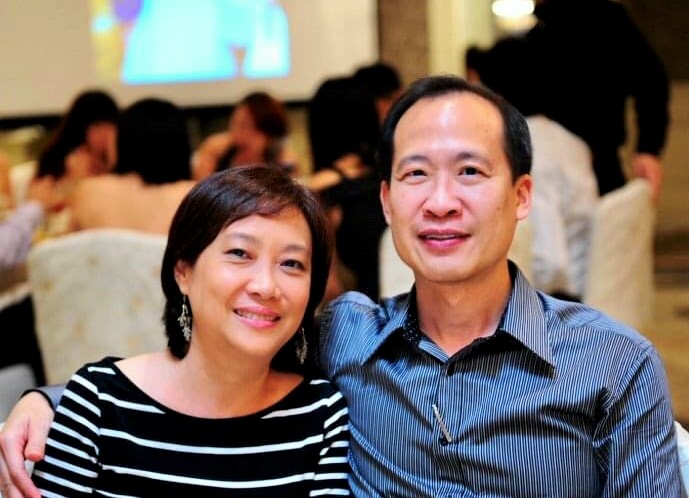
Janet Lee and Jeremy Chan in a 2011 photograph. Three years after this photo was taken, Jeremy's mother passed away and he developed depression. All photos courtesy of Jeremy Chan.
When Jeremy Chan’s mother fell ill suddenly with a rare blood cancer in the bone marrow, no one initially knew what she was suffering from.
She was in her late 70s and it seemed like a urinary tract infection that just would not go away. Soon, however, the usually healthy woman who used to play tennis, swim, cycle, bowl and run, became too ill to even manage herself.
So began a six-month journey of intense caregiving for Jeremy towards the end of 2013.
What Jeremy didn’t realise at the time was that his mother’s decline would also usher in his own decline for the next few years.
The painful decline
Almost every day, the IT professional would take a bus from his workplace to his mother’s home in Serangoon to care for her. Sometimes he went during his lunch hour. Sometimes he would go after work. Often, he would visit her two to three times a day.
“She became incontinent. The house became very dirty. She was living with my dad but he couldn’t help clean up,” said Jeremy, 57.
Though he had an older brother, his brother was busy with work. His parents did not want to hire a domestic helper either.
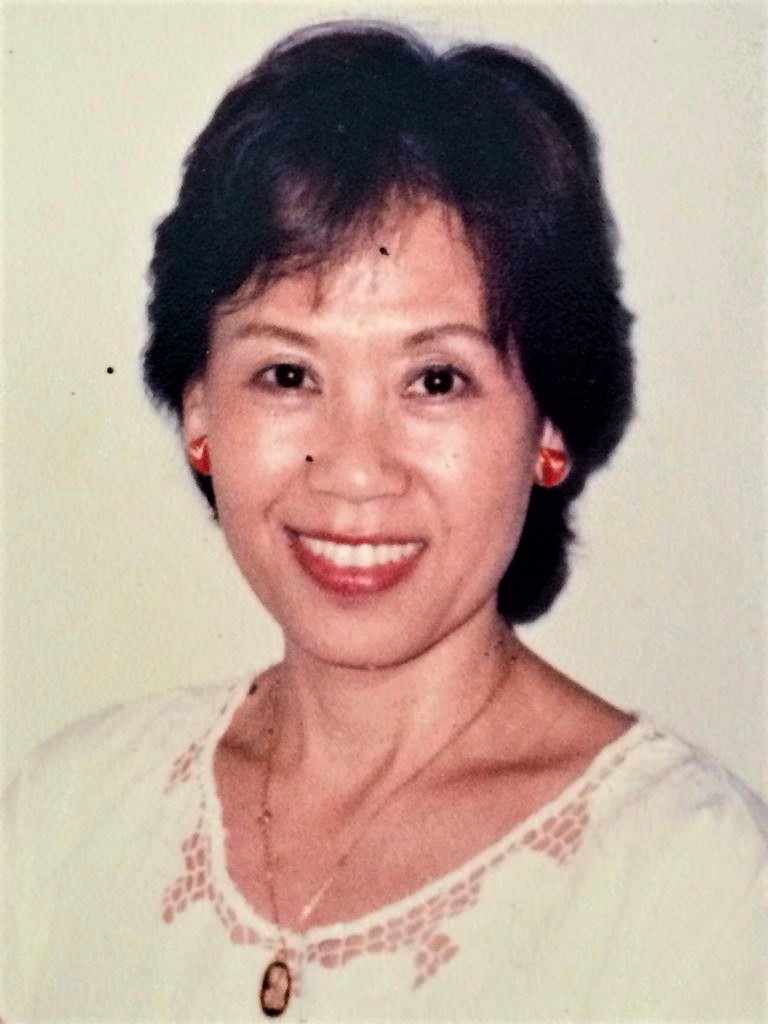
Jeremy’s mother, Mavis Sam, in a photo taken when she was in her 60s. A former model, she remained active throughout her life until her illness.
“They were adamant they didn’t want one,” said Jeremy’s wife, Janet Lee, 59.
The care and cleaning fell to the couple.
“Mum kept asking me, ‘Jerry, when can I go home?’”
Said Janet: “Jeremy did most of the work. I would boil soups that she liked on weekends.”
By January the next year, his mum’s condition had deteriorated so much that she was warded in a hospital. Doctors ran a gamut of tests but were still baffled.
“Every time we thought the fever had gone, it would return,” recalled Jeremy.
There was also the pain of watching his mother suffer emotionally. “Mum kept asking me, ‘Jerry, when can I go home?’”
“We tried all ways and means to bring her home, but there was no good solution,” he said, choking up at the memory.
When the diagnosis finally came in late March, there was little that could be done for her.
“There was not much of a cure except for some designer drug that had no guarantees and the same side effects as chemo.”
Palliative care was the only option. On Good Friday that year, she passed away. She was 79.
Guilt and grief
Jeremy and Janet, who married late and do not have children, tried to regain some normalcy in their lives after the passing of his mother. They even went on a holiday together.
“But the relationship started to crack. We would have more arguments. I didn’t understand why,” said Jeremy.
“Relationships in church also started to break down. There was some talk that I was seeking attention.

Jeremy and Janet on holiday in 2013 at the Grand Canyon, USA. They went on another holiday the next year after his mother passed away in the hopes of cheering Jeremy up.
“I was trying to figure out what was wrong. I was seeking validation that I was okay. I was very hurt and in pain inside.”
To most, he had done all that he could have and more for his mother. But he was wracked with guilt.
“We weren’t close. I was feeling a lot of guilt and condemnation for being too busy with my career and life to spend more time with her,” said Jeremy, tearing up.
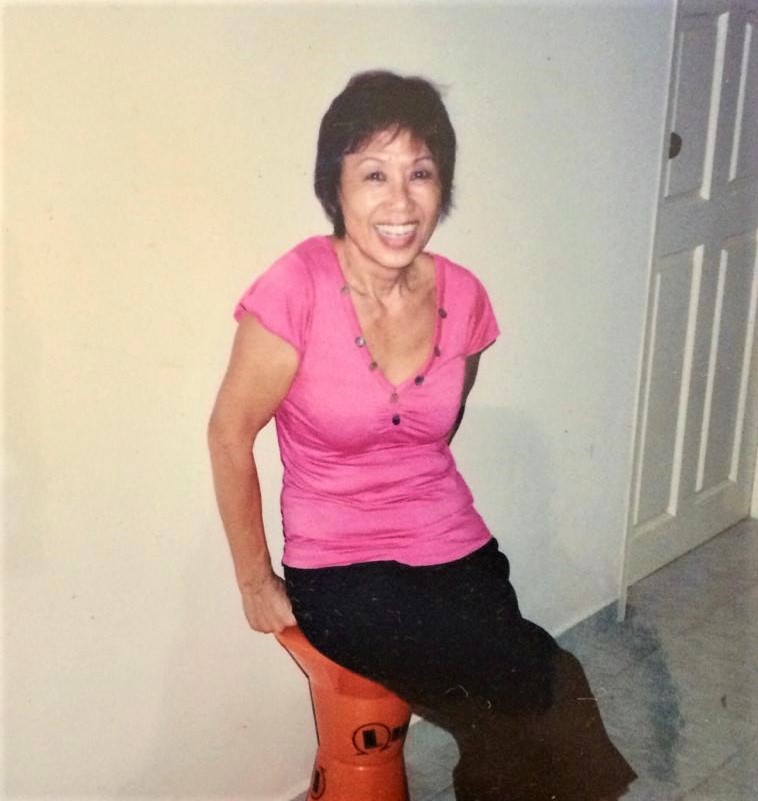
Though he took care of his mother in her last days, Jeremy was consumed by the belief that he could have done more.
The thoughts would not leave him alone. As he soldiered on with work and ministry in church, he “became very robotic”, noticed his wife.
“I was very angry with God. Where were you? Why didn’t you answer our prayers? What is going on with me?”
Jeremy did not know it then but he was suffering from psychomotor retardation caused by depression. The impairment slows down thoughts, emotions and movement.
“I would catch myself walking from the office to the bus-stop, or vice versa, in a very slow manner. I was odd.”
Bouts of weeping followed. Seemingly innocuous things would trigger him.
“Songs,” quipped Janet.
“Amazing Grace was a killer for me,” recalled Jeremy quietly.
That was the song the crematorium had played at his mother’s funeral. The first time he heard it after her death, he was at a cell group meeting.

Janet and Jeremy serving in the worship team at their church camp in 2012. He later quit the ministry because certain songs triggered a strong reaction and he found it difficult to worship God.
“I had a lot of flashbacks. I wanted to go into a corner, and hide and cover myself.”
Two days later, the song was played during the church service. Chan had to escape to the carpark on the ground floor to compose himself.
In the end, he stopped serving in the worship ministry.
“It was difficult to worship God. I was in too much emotional pain. I was very angry with God. Where were you? Why didn’t you answer our prayers? What is going on with me?”
The long struggle
He sought counselling from the church. “I had meetings with my mentor and ended up crying for up to 45 minutes. I would get so tired from crying that I would fall off the chair.”
It was a church friend who gently suggested that Jeremy might be suffering from depression.
“I thought, ‘God, PTSD? This happens to people who have gone to war.'”
“After I was told that, I went to seek professional help. I was willing to seek help because at least there would be a name to what I was suffering. I was at my wits’ end.”
The doctor confirmed that he was indeed suffering from major depressive disorder brought on by post-traumatic stress disorder (PTSD).
“I was burnt out from caregiving.”
The diagnosis surprised his wife.
Said Janet: “I thought, ‘God, PTSD? This happens to people who have gone to war.’ But God assured me, ‘I will lift him up from the miry clay’.”
Jeremy went on medication. He also started weekly counselling sessions with a Christian psychologist. It would take another three years or so before the right medication and dose were found.
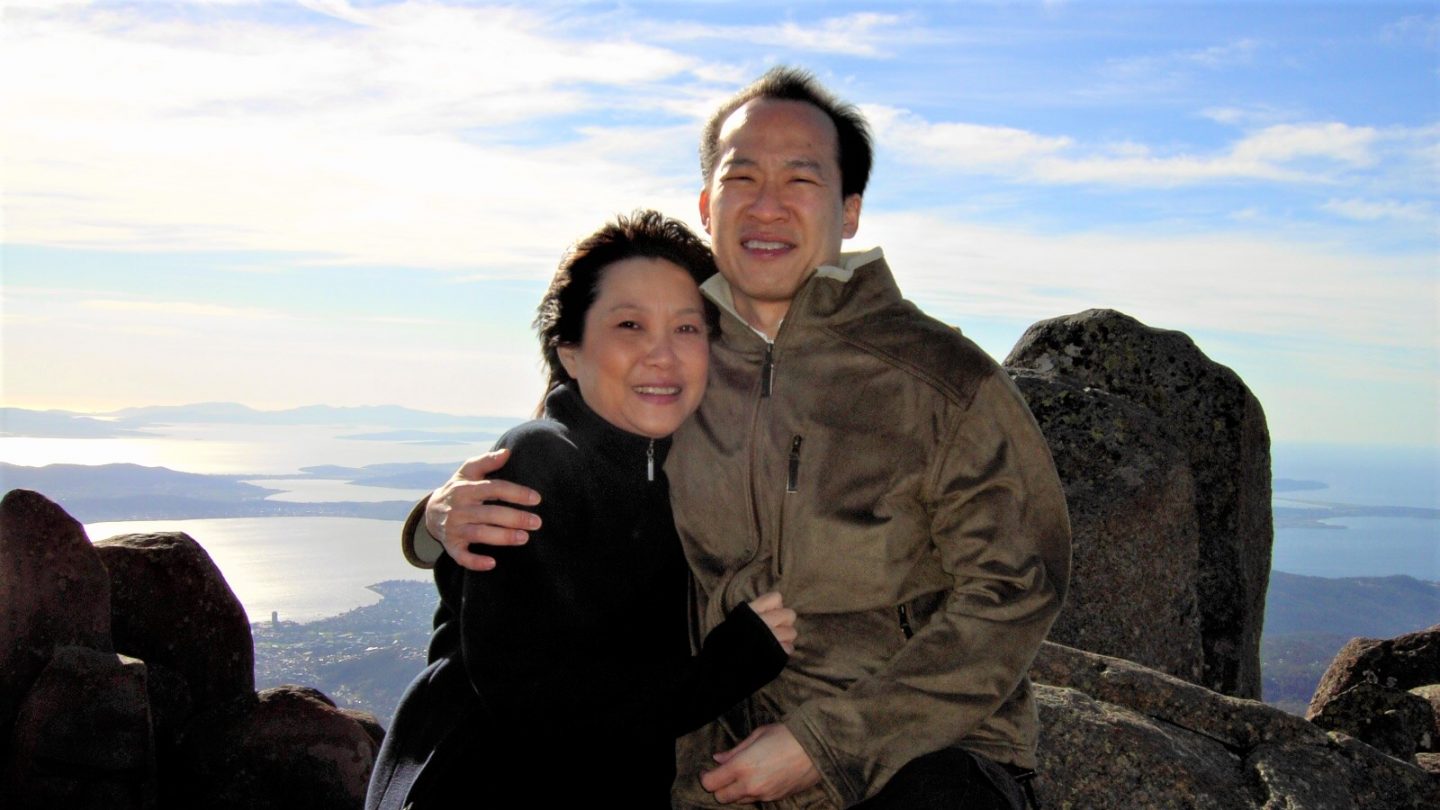
The couple in Tasmania in 2007.
“Initially, the medicine helped me feel slightly better. But soon after, it would lose its effect. I felt tired, about to crash.
“People with mental health conditions get very tired because the mind keeps ruminating. We are battling things in our heart and that causes a lot of exhaustion.”
Ironically, sleep would evade him. The very thoughts that tired him also kept him awake.
Then, there was the constant sadness, heaviness and pain punctuated by emotional breakdowns.
“I heard God say that I was to use my pain and suffering to help those suffering the same mental health issues.”
“Each time I crashed, I couldn’t believe that I had crashed deeper than the last crash. Every crash would be lower, deeper, longer and more painful. I would wonder, ‘How much lower can you get if you are (already) beneath a rock?’”
Jeremy would later learn that his experience was not unique. “People with mental health conditions crash many times.”
But back then, he was confused and hurt. Every breakdown made him angrier with God.
“Why is this happening? Why isn’t healing happening? And I heard God say that I was to use my pain and suffering to help those suffering the same mental health issues.”
That would not be for another four years.
Meanwhile, Jeremy had to change jobs because he could not cope at work. The change did not help. So, in 2016, he took the “leap of faith” and retired early.
“I was not getting better. In fact, I was getting worse.”
Thoughts of suicide would come. “I just wanted to stop the pain.”
His rock
It was just as painful for his wife to watch the man she loved become “like an old man”.
“By nature, he was more emotional than other men. But he was a very active person. He enjoyed the sun, walking, swimming, jet-skiing, all the sea sports.
“But it came to a point that I could barely get him out of the house to walk with me for 15 minutes.”
As Jeremy retreated into his pain, too tired and hurt to even talk much, his wife wrestled with her emotions. “When he went into depression, I felt guilty that, as I wife, I didn’t journey enough with him in his role as a caregiver.”
Even when Jeremy did surface to interact, it was challenging.

With their god-grandson, Josh-Caleb Yap. The couple takes care of the toddler while his parents are at work.
“If you don’t meet certain needs or expectations, he would lash out.”
Smells would trigger breakdowns. A bus ride to the mall nearby would end up as a major expedition.
“Smells were bad triggers. If the bus smelled of urine, we would have to change buses even though I couldn’t smell it,” said Janet.
“We would change so many buses just to get to our destination that I would think, ‘You very mafan’ (troublesome).”
“On the worst days, I would tell myself to give it one more day. One more day, then one more day.”
Janet took to monitoring her husband’s snoring pattern to see if he was going to “crash” again. “When he is extremely tired, he would snore loudly. I would monitor and ask him, ‘Are you feeling down?’ And he would say, ‘Yes’.”
When Jeremy had thoughts of ending his life, Janet would urge him to carry on.
“I told him, ‘Don’t think you want to end it. I cannot live life without you. You need to hang on’. I wanted to make him feel needed.”
Jeremy found that this helped. “She was like a solid rock, a reminder that I needed to keep fighting.
“On the worst days, when I was ready to go, I would tell myself to give it one more day. There was always the next day. That was the repeating pattern. One more day, then one more day.”
Janet took to baking her husband’s favourite cookies and cakes, and cooking his favourite dishes. When he could no longer read the Bible, she prayed.
“God said to me, ‘You read to him’.” So, she did. She even bought him colouring books with Bible verses.
Other things changed for Janet as well. She stepped down from the worship ministry.
“It was very tough. When he stepped down, I continued to serve. Standing up there, seeing him not being able to worship, was hard. This was a man who had been so fervent, so joyful in loving God.”
Through it all, Janet sought solace from God.
“I would cling to God. I know that He is God. I know for a fact that when I am really so tired, I can cry out to Him.”
At a healing retreat, Jeremy had a vision of the very verse God had given Janet earlier (Psalm 40:2).
She would listen to worship songs and pray aloud. “It built my faith. Otherwise, I would not have been able to journey with him.”
In turn, God gave her many assurances. At a Restoring the Foundations healing ministry, Jeremy had a vision of the very verse God had given Janet earlier (Psalm 40:2).
“He saw himself being lifted up from the beach, from soft sand to the rock,” she said.
“I was on a walk and God asked me to tell my husband that He would lift him up from the miry clay and I asked God, ‘Do you think he will understand?’”
She returned and shared with her husband God’s assurance. “I believed,” said Janet simply.
There would be other occasions of comfort.
“We went to Israel and I was at the Sea of Galilee when I cried out to God,” remembered Janet. “It had been a year or so and there was still no healing.

At the Sea Galilee, where Janet cried out to God for help.
“God told me, ‘Don’t worry. It will happen’. And He gave me Isaiah 60:1 – Arise.”
She clung on to His promises for the next two years.
Crying and healing
The breakthrough came when Chan enrolled in Tung Ling Bible School in July of 2016.
“God told me, ‘Don’t worry. It will happen’. And He gave me Isaiah 60:1 – Arise.”
Asked what prompted the seemingly sudden decision, Janet chipped in before Jeremy could answer: “The wife was praying very hard!”
Janet herself had studied in Tung Ling Bible School years earlier. “I knew that, at some time in his life, he needed to encounter God. So the dean of the school, my cousin and I were praying for him.
“Every time we prayed, it seemed that the timing was not right. One day, we were praying and we looked at each other and said, ‘It’s time’.”
She went home and told her husband.
“He said, ‘I think it’s time, too’.”
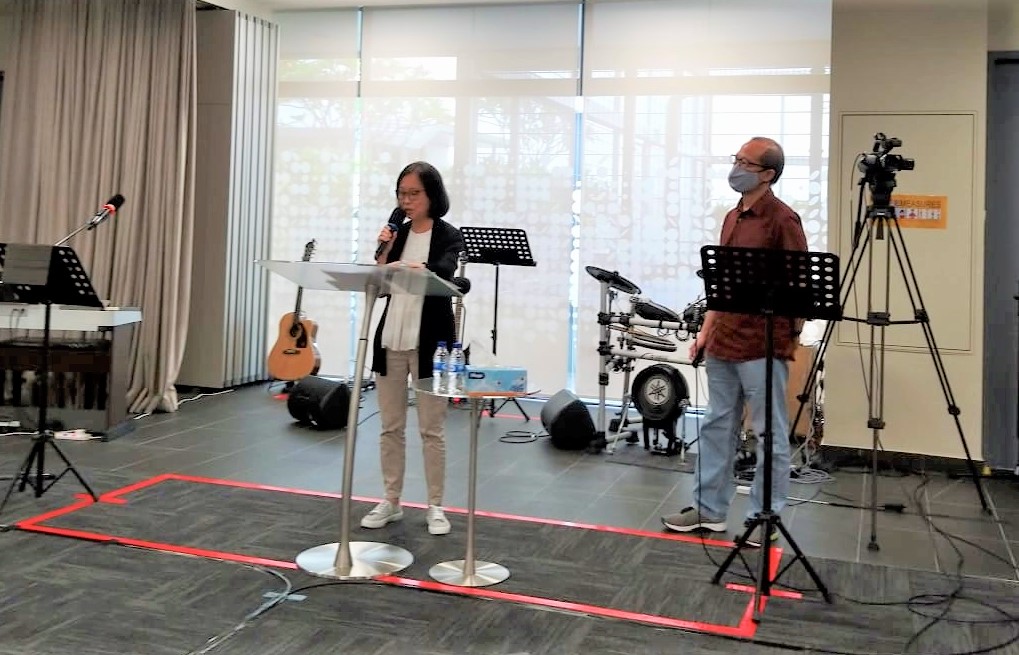
Janet and Jeremy sharing their testimony at a devotion session at Tung Ling Bible School.
The constant immersion in the Word of God and the care of other Christians started Jeremy on the road to recovery.
“Every few days, there would be a different pastor ministering to me. And there was the reinforcement of God’s Word that I was His precious child,” he said. “I was crying and healing.
“Psalm 139:16 assured me that God knows. He is already orchestrating things that I’m not even aware of.”
“Whatever the barrier that was stopping me from healing was removed. That was when I was able to forgive God, forgive myself. I was given the word to just wait, be faithful and wait upon the Lord.”
During a module called Silence and Solitude, as Jeremy was meditating on Psalm 139, God spoke to him through the Word.
“It was the verse that talks about how our lives are already in the Book even before we know it. Psalm 139:16 assured me that God is with me, God knows. He is already orchestrating things that I’m not even aware of.”
Slowly, the heaviness lifted. He became well enough to ask to be weaned off the medication. It would be another year-and-a-half before he was able stop his medication entirely.

With their goddaughter, Jean, and her husband, Paul Yong, on their wedding day. Journeying as a couple through Jeremy’s depression has strengthened Janet and Jeremy’s own marriage, they said.
Since 2019, Jeremy has been using his experience to help others recover from their mental health conditions.
Janet, who is retired, has found a new calling, too.
“We don’t need to be afraid, don’t need to be concerned what the future holds for us. He holds the future for us.”
“My calling is to give people a listening ear,” she said. “Journeying with him has trained me to be a good listener. So, we listen, we don’t prescribe. Just go, ‘Uh-huh’. No advice. Don’t say, ‘I understand’. You cannot understand what they are going through.”
Their shared experience has strengthened them individually as well.
“I’m quite an impatient person, quite a strong-willed person,” confessed Janet. “But God has taught me to be patient. I’m grateful for His transformation.
“And I learnt to be submissive to my husband, to be his helper. God taught me to be tenderly devoted.”
Added Jeremy: “Our marriage has become much stronger. We have learnt that there is love and care for each other. God has orchestrated this. God is in the centre of our lives, our marriage.
“We don’t need to be afraid, don’t need to be concerned what the future holds for us. He holds the future for us.”
RELATED STORIES:
Heartbreaking number seek help for kids with depression: Salt&Light Family Night
“How do I help a friend with depression?” And other questions we posed to psychiatrist Dr Leslie Lim
We are an independent, non-profit organisation that relies on the generosity of our readers, such as yourself, to continue serving the kingdom. Every dollar donated goes directly back into our editorial coverage.
Would you consider partnering with us in our kingdom work by supporting us financially, either as a one-off donation, or a recurring pledge?
Support Salt&Light


